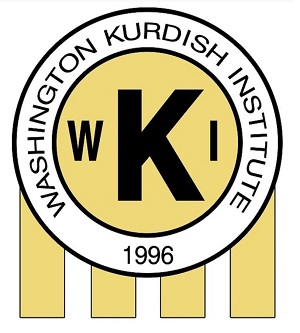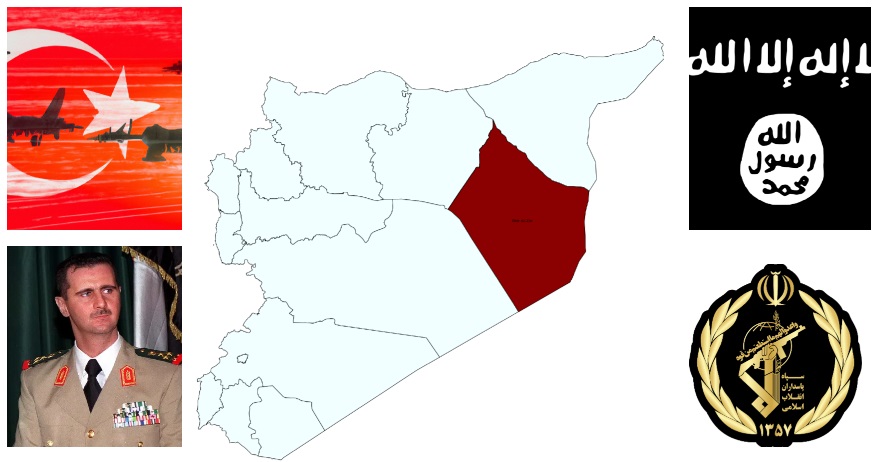Washington Kurdish Institute | October 4, 2023
Monitoring Developments in Deir Ez Zor: Syria’s Dynamics, Regional Players, and Implications for the United States
The Kurdistan Region of Syria (Rojava) and its governing body, the Autonomous Administration of North and East Syria (AANES), have faced existential threats since the opening stages of the Syrian Civil War. From its earliest days, the AANES has endured pressure and attacks from Da’esh, Turkey, Iran, the Assad Regime, and multiple other rebel groups and proxy militias of various allegiances. Over the past several weeks, the AANES has experienced internal strife and clashes in the Arab majority province of Deir Ez Zor, where Da’esh was territorially defeated. Over the past two weeks, it has been the center of fighting between the Kurdish-led Syrian Democratic Forces (SDF) and some of the Arab tribal fighters friendly to the Assad regime and Iran.
Over the past year in particular, multiple external and internal actors have sought to undermine the AANES, with the ultimate goal of destroying the political assembly. The growing strategic relationship between the Assad regime, Turkey, Iran, and Russia has naturally led to a shared interest in dismantling the AANES. The Assad regime and its patron Iran, in particular, have worked to sow discontent within Rojava. Damascus has attempted to turn certain non-Kurdish SDF commanders and tribal militias against the AANES. This was done with the obvious intent of destabilizing and overthrowing the AANES so that the Assad regime or Turkish-backed Islamist terrorists could divide up Rojava among themselves.
The most recent developments in Deir Ez Zor began with the arrest of Ahmed Khbeil, better known as Abu Khawla, who commanded the SDF-affiliated Deir Ez Zor Military Council. The SDF has charged Abu Khawla with several complicity in drug trafficking, mismanagement of security, failing to curb ISIS activities, the recruitment of a private militia outside the purview of the SDF, and cooperating with foreign powers hostile to the Rojava revolution. According to experts, Abu Khawla was thought to have been drifting closer to the Assad regime and had been in talks with Iranian militias in recent months. There were also claims that he had been in contact with Turkey and the Ankara-backed remnants of the Syrian opposition in the country’s north. His defection to either camp would have severely undermined the autonomous administration and increased the likelihood of widespread bloodshed.
Concurrent with Abu Khawla’s arrest, the SDF (in conjunction with coalition partners) launched Operation Security Reinforcement, at the behest of local elites in Deir Ez Zor, to dismantle drug trafficking and Da’esh cells in the area. However, the operation also aimed at suppressing tribal fighters loyal to Abu Khawla, who were expected to rise up in response to his arrest. Pro-Damascus fighters also crossed the Euphrates after Abu Khawla’s arrest, according to the SDF. As a result of this operation, the SDF took control of the last rebellious tribal-held town of Dhiban in the past week. The SDF has publicly condemned the Assad regime for inciting unrest in Rojava through its efforts to gain the allegiance of local Arab commanders and exhorting tribal uprisings. In turn, Syrian, Iranian, and Turkish media have portrayed the clash between the SDF and Assad-leaning tribes as a Kurdish-Arab ethnic conflict. However, the vast majority of Arab tribes, tribal leaders, and the numerous Arab militias under the SDF’s allegiance, and the staunchly pluralistic and multi-ethnic ethos of Rojava, stand in contradiction to this narrative of a Kurdish-Arab ethnic conflict. The deadly unrest stems from Damascus and Tehran interfering in the internal affairs of the AANES, which is now unable to focus on the war against Da’esh given the potential for attacks and interference from outsiders.
The situation in Deir Ez Zor was compounded by a concurrent attack on villages around Manbij by the Syrian National Army (SNA), a coalition of mainly Islamist militias backed by Ankara. Although the Manbij Military Council successfully repelled the attack, the event is indicative of the growing collaboration between Ankara, Moscow, Damascus, and Tehran, aimed at weakening the AANES. Each of these countries has its own motives to work toward Rojava’s destruction. Damascus and Tehran seek to restore the pre-civil war control of the Assad Regime, and Turkey is intent on undoing the administration of a Kurdish-led autonomous zone on their border, which Erdogan views as an intolerable reality. Moscow supports the elimination of Rojava as a way to erode the United States’ presence in the Middle East, partially as a response to Washington’s continued support for Ukraine.
Rojava’s dissolution would be a strategic setback for the United States in the Middle East, given that the SDF has proven to be the global coalition’s only reliable partner against Da’esh in Syria. While the United States and the Kurds of Syria, especially, would be the primary losers if the AANES were to be overthrown, there would be multiple beneficiaries of this disastrous hypothetical. Turkish-backed Islamist terrorist groups, the dictatorial Assad regime, Russia, the increasingly adventurist Iranian regime, and Da’esh, which is looking to restore their lost territory, would all benefit significantly from a greatly diminished Rojava. Rojava is an obstacle to the authoritarian and extremist actors in the region, and a representation of successful United States foreign policy that Moscow wishes to undo.
It is no surprise that the adversaries’ hostile to Rojava have advanced a narrative that the current conflict east of the Euphrates is an ethnic conflict between the Kurdish administration and Arabs living under it, but there is no basis for this claim. The multi-ethnic nature of Rojava, the vast number of local Arab elites, tribes, communities, political associations, and militias loyal to the AANES, is a testament to this diverse and pluralistic community. Abu Khawla is a warlord-minded opportunistic commander who was exploited by Syrian and Iranian interference.

